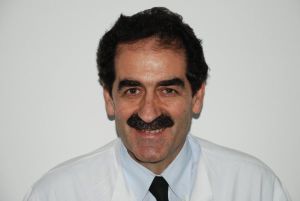You are here: The Observer
| Behind a Doctor’s Smile Stands Patients’ Gratitude December 10, 2009 - Sofia Bisa |
|
 |
Dr. Apostolos Belos stood at the entrance of Sismanoglio hospital. He has dark hair, a mustache, touches of grey, and a sweet smile. We took the elevator to the third floor and, as we walked through a long dark hallway, pale people walked around in their pajamas, some holding their serum in one hand.
|
Why would someone want to work in such an environment? As one of those pale people approached Dr. Belos, he took his hands and held them tightly. “Dr. Belos, I would like to thank you for helping me. Thank you for caring for me. You are an incredible person, a very decent and wonderful man. Thank you for everything. Thank you, thank you, thank you,” he said as tears fell from his eyes. Belos’ eyes glowed and the sweet smile appeared again. “Moments like that make me forget the stress and anxieties of my work and really feel that I couldn’t be anything else but a doctor,” he said. His office combines two different spaces in one room: an examination room and a mini library. Entering the office on the left side, there is an examination bed with curtain separating it from the rest of the room. On the right, there is a desk piled with papers. Behind the desk stands the mini library, stuffed with medical books and medical encyclopedias. “When you are a doctor you never stop studying,” Belos said. Ten pictures or so of his family stand out on the wall, as if he wanted to warm up the cold place he works in a little, and make himself feel closer to home. Belos said that stress and anxiety are an everyday companion in his job. Just thinking that a life is hanging on you is stressful enough. But he constantly needs to be physically and psychologically at peace and harmony to be able to cope with the demands of his work. “Personal problems stay out of the surgery room, otherwise you become a bad doctor,” he said. “The most difficult days are the surgery days.” That day he had no surgeries; he would just check on patients. But the day before he had had a very serious operation that had lasted for seven hours. “When you start the surgery the stress is gone,” he said. But how can you be calm in an operating room for seven hours? To loosen up, doctors put on some music, tell jokes to each other, and discuss different things, such as movies they saw the night before or how their children are doing at school. But the toughness of his profession does not stop with surgery. When he has to examine hundreds of patients every week, tough situations are inevitable. People are so afraid of hospitals and illnesses that they often act irrationally. There are patients that exaggerate and portray a problem as being bigger than it really is. There are patients that do not want to be touched and others who behave badly towards doctors and staff and are hard to communicate with. A good doctor has to adapt to different situations and act with responsibility and understanding. “There is a patient who is around 70 years old, alone in the world, and he is constantly calling me and other colleagues, believing that he is not cured,” Belos said. “There are times that this becomes frustrating, but we have to show understanding to a man who tries to get over his loneliness by putting doctors in his life.” Belos’ phone rang. It was a woman worried about her husband. Belos talked to her in a calm, steady voice, giving her advice and reassuring her that everything would go perfectly well. When he hung up, he said, “Her husband has cancer and she doesn’t want him to know. People are so worried when someone they love is sick. One of the most difficult times in my job is when I have to announce to people that they have cancer.” Belos still does not know why he decided to become a doctor at the age of 17. But now he knows that he couldn’t be anything else but a doctor. “Giving life and saving lives is one of the most incredible feelings,” he said. Whenever he makes a correct diagnosis and gives the right treatment, or whenever an operation goes well, the pleasure he gets as a person and as a professional give him the sweet smile he had at the hospital entrance. The gratitude and respect he gets from patients and colleagues give him the authority of a worthy doctor. Belos remembers when, three years ago, a patient knocked on his door and entered the office with sparkling eyes and a broad smile. He had come to his office to thank him for a successful operation that Belos had carried out on his father almost ten years before. “Moments like those remain indelible in your memory, and make all the stress and fatigue of the work worth every penny of it,” Belos said, the sweet smile appearing on his face once again. |
|
